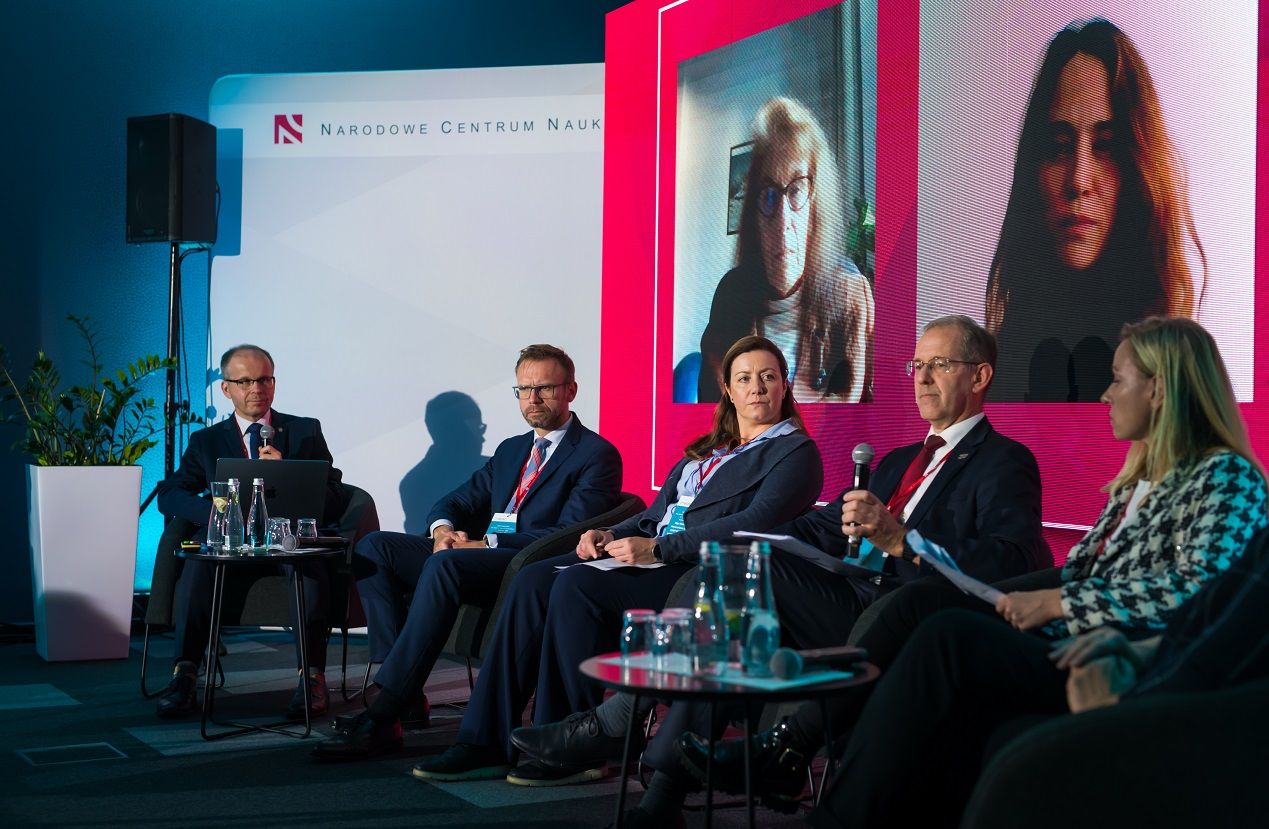The second EOSC Festival 2023.The National Tripartite Event Poland gathered the stakeholders of European Open Science Cloud (EOSC), who engaged in discussions on Open Science (OS) and the future of the EOSC. The focus was on key issues related to OS policy and implementation and EOSC development in Widening Countries and beyond. With over 40 contributors from 13 countries, it attracted more than 258 participants, both in-person and online.
 Bertil Egger Beck, European Comission, photo credit: Michał Łepecki
The distinguished keynote speakers included Bertil Egger Beck from the European Commission’s DG Research and Innovation (DG RTD), Volker Beckmann, the French delegate to the EOSC Steering Board (EOSC-SB), Karel Luyben, President of the EOSC Association (EOSC-A) and Mateusz Gaczyński from the Polish Ministry of Education and Science. Additionally, contributors from Bulgaria, Croatia, Czech Republic, Georgia, Lithuania, Malta, North Macedonia, Serbia, Slovakia, Romania, Ukraine, and Poland discussed the EOSC readiness from the perspective of their countries. The 19 Polish stakeholders demonstrated long-term commitment to developing OS and EOSC infrastructures, services, and skills in Poland, aiming to establish a mature and fully operational EOSC national structure.
Bertil Egger Beck, European Comission, photo credit: Michał Łepecki
The distinguished keynote speakers included Bertil Egger Beck from the European Commission’s DG Research and Innovation (DG RTD), Volker Beckmann, the French delegate to the EOSC Steering Board (EOSC-SB), Karel Luyben, President of the EOSC Association (EOSC-A) and Mateusz Gaczyński from the Polish Ministry of Education and Science. Additionally, contributors from Bulgaria, Croatia, Czech Republic, Georgia, Lithuania, Malta, North Macedonia, Serbia, Slovakia, Romania, Ukraine, and Poland discussed the EOSC readiness from the perspective of their countries. The 19 Polish stakeholders demonstrated long-term commitment to developing OS and EOSC infrastructures, services, and skills in Poland, aiming to establish a mature and fully operational EOSC national structure.
Overall, the event significantly enriched discussions on OS policies and their implementation at both national and European levels, focusing on the future of EOSC and considering the perspectives of Widening Countries in these discussions. It provided a strong foundation for future collaborations.
The event was hosted at the headquarters of the National Science Centre in Kraków on November 6th and 7th.
The National Science Centre wishes to acknowledge all EOSC Festival contributors: speakers, panelists, moderators, and participants.
Representatives of the Widening Countries
Ana Proykova (Sofia University, Faculty of Physics, HPC Laboratory, Bulgaria); Ivan Maric (University Computing Centre (SRCE), University of Zagreb, Croatia), Olga Bohuslavova (Masarykova University CERITSC/Sekretariát EOSC-CZ, Czech Republic), Tatia Mtvarelidze (Ministry of Education and Science of Georgia), Artūras Kaklauskas (Research Council of Lithuania), Ernest Cachia (University of Malta, Department of Computer Information Systems, Malta), Anastas Mishev (University of Ss Cyril and Methodius, Faculty of Computer Science and Engineering, North Macedonia), Alina Irimina (UEFISCDI, Romania), Biljana Kosanovic (University of Belgrade, Serbia), Milica Ševkušić (Open Access Programme, Project Coordinator EIFL – Electronic Information for Libraries, Serbia), Anna Krivjanská (Slovak Centre of Scientific and Technical Information representatives of EOSC TF Upskilling Countries, Slovakia), Volodymyr Nochvai (Virtual Center for Digital Innovation NOSCUA DIH, Open Innovation Lab, Kyiv Academic University, Ukraine), Sergiy Svistunov (Bogolyubov Institute for Theoretical Physics of the National Academy of Science of Ukraine (online).
Polish stakeholders
Dominika Czyzak (Nicolaus Copernicus University in Torun), Dariusz Ignatiuk (Polish Polar Consortium), Mateusz Gaczyński (Ministry of Education and Science, Poland), Tomasz Jałukowicz (SWPS University), Szymon Kubik (Collegium Medicum of Jagiellonian University), Krzysztof Kurowski and Raimundas Tuminauskas (Poznan Supercomputing and Networking Centre, Mariusz Majdański (Institute of Geophysics of Polish Academy of Sciences), Maciej Maryl and Tomasz Umerle (Digital Humanities Centre, the ILR of the Polish Academy of Sciences), Dawid Matuszek and Maciej Bisaga (University of Silesia in Katowice), Marcin Michalak (Łukasiewicz Research Network – Institute of Innovative Technologies EMAG), Jakub Szlachetko (SOLARIS Centre National Synchrotron Radiation Centre, Jagiellonian University), Marcin Pałys (European University Association), Maciej Piasecki (University of Science and Technology in Wroclaw, CLARIN-PL), Jakub Rusakow (Gdansk Medical University), Leszek Szafrański (Jagiellonian University), Jakub Szprot (Interdisciplinary Centre for Mathematical and Computational Modelling University of Warsaw), Roksana Wilk (Cyfronet AGH in Krakow), Anna Zatora (University of Lodz).
The representatives of the Tripartite Collaboration: The European Commission EOSC Steering Board and EOSC association
Bertil Egger Beck from the European Commission’s DG Research and Innovation (DG RTD), Volker Beckmann, French delegate to the EOSC Steering Board (EOSC-SB), Karel Luyben, President of the EOSC Association (President, EOSC-A) and Isabel Caetano (Senior Stakeholder Engagement and Outreach Officer, EOSC-A).
 Panel discussion, EOSC and Open Science: policies and implementation, photo credit: Michał Łepecki
Panel discussion, EOSC and Open Science: policies and implementation, photo credit: Michał Łepecki






























